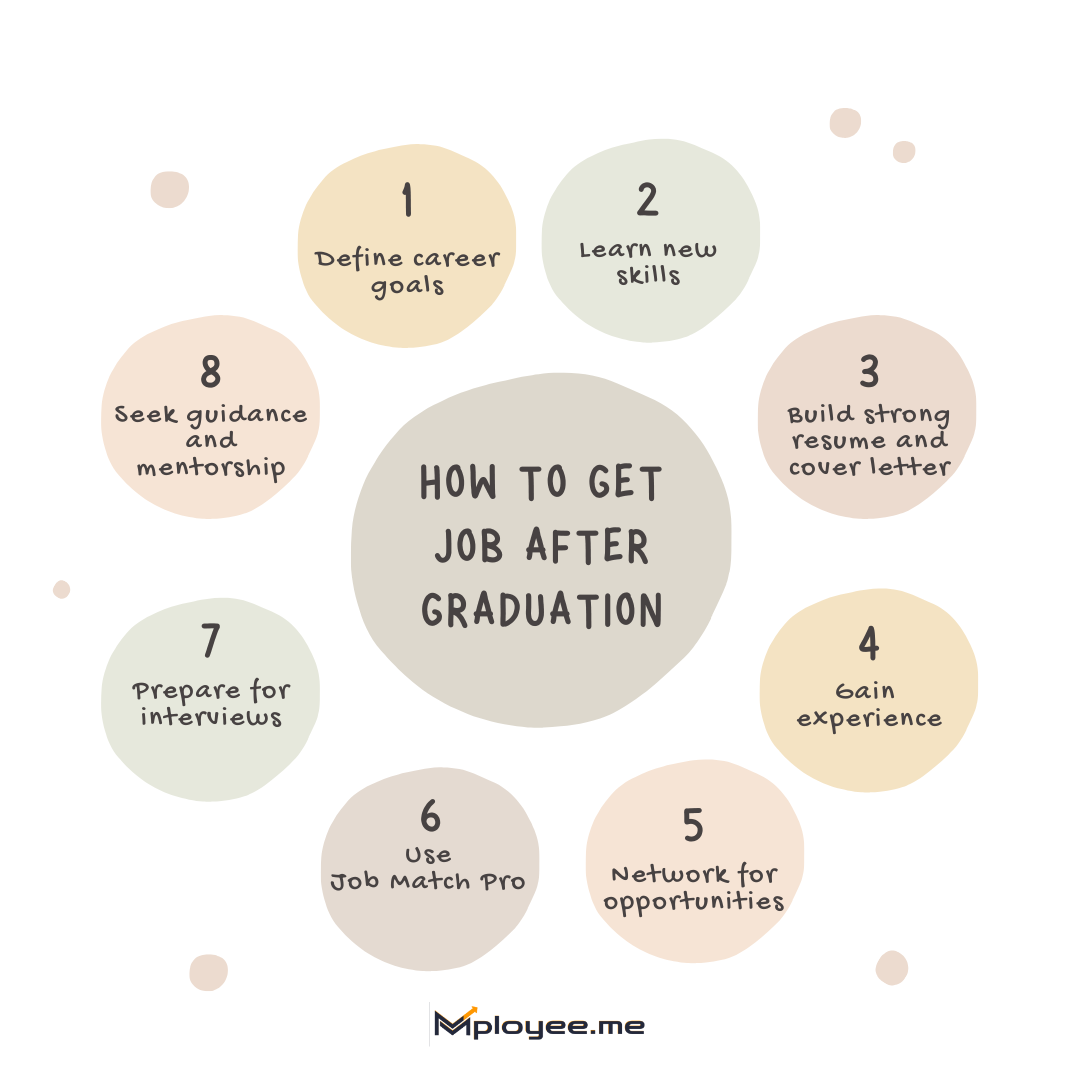
We'll cover
How to Get a Job Immediately After Graduation 2026
Written By Editorial Team

We'll cover:
How to Get a Job Immediately After Graduation 2026
College graduation has just happened. Now comes the next big step: the start of your career. Working on getting a job straight after graduation might seem hard, but it is possible with the right approach. If you're searching for entry level jobs acting as fresh graduates, following the right steps will help you quicken and smoothen the whole process.
Finding your first job is far from luck; it's well-planned and strategized along with skill-building and the right set of tools. Let's take on how to start a career on a successful note.

1. Define Your Career Goals
The first step after graduation is exploring yourself. Before job applications are sent out, look for your interests and strengths. Ask yourself: What kind of job excites me? What have I been best at? Where do I picture myself in a few years?
- Choose Your Field: Say if you like working with the computer, you would want a job in software development, IT support, or web development. If you like organization and management you could go for business, operations, or project management. And creative fields are a great choice for new graduates in content creation, designing, or digital marketing.
- Decide on the Type of Work: Some students feel that graduate trainee jobs would be good for them, with some on-the-job training, while others are interested in entry level jobs for direct contribution.
- Consider Progress: See how this role would help you learn skills and grow in your career after graduation. Learning opportunities and mentoring are essential for long-term development.
2. Learn New Skills
Having a degree gives you knowledge but possessing a set of skills beyond that degree would more likely attract an employer.
- Learn Online: Learn coding, data analysis, digital marketing, or design skills through any of Coursera, Udemy, or LinkedIn Learning. These are mostly helpful for jobs in the entry level in IT and other technical areas.
- Develop Soft Skills: Some of these soft skills that are important in almost all fields are communication, teamwork, problem-solving, and time management.
Skills get equal importance as academic qualifications from an employer's perspective. Any small assignment or a project undertaken personally is considered a value addition while looking for jobs.
3. Build a Strong Resume and Cover Letter
An employer will have the first impression about candidates from the resume and cover letter for a graduation job.
- Make It Clear: Your resume should put into focus your education, internships, projects, and achievement, without much detail.
- Tailor Each Application: Tailor your resume for each job description listing. Follow the skill requirement listed in the job description that says why you would be an excellent fit. Tools like Resume Keywords by mployee.me can help you in it. This tool analyzes both your resume and the job description, identifies keywords for the resume that should be included or eliminated. By aligning your resume with ATS requirements , it significantly improves your chances of passing the initial screening and getting noticed by employers.
- Use Action Words: Action words such as “developed,” “led,” “created,” and “implemented” allow you to show what you did for an organization.
- Check Resume Score: After customizing your resume, it is a must to check your resume score. To check your resume score for free, you can use ResuScan. It is an advanced resume scanning tool that evaluates your resume across 40+ key factors to ensure it passes Applicant Tracking Systems (ATS). Using ATS score checker, you can optimize your resume for compatibility, increasing your chances of getting noticed by HR & bypassing ATS.
4. Gain Experience Through Internships and Projects
Experience, even short-term, is highly valued by employers.
- Internships: Offers hands-on learning and sometimes leads to full-time roles.
- Volunteer Work: Being active in college clubs, NGOs, or other things the community may undertake shows initiative, and responsibility.
- Projects: Get into developing some apps, websites, or create some design portfolio projects to show that you have actually done it.
Embrace every internship, project or job as a chance to build experience and learn new skills. Go ahead and put them on your resume as they are worthy of graduate trainee jobs.
5. Network for Job Opportunities
Networking opens the doors for opportunities that never get publicly advertised.
- Talk to Alumni and Seniors: Reach out to them for guidance on career after graduation, as they can often share insights and inform you about job openings.
- Attend Workshops and Events: Conferences, seminars, and job fairs are great places to meet professionals.
- Use Online Platforms: LinkedIn is especially useful for connecting with recruiters, professionals, and industry leaders.
6. Use Job Match Pro to Simplify Your Search of Jobs After Graduation
Job hunting can be overwhelming with the thousands of openings available online. Job Match Pro serves to ease your search and match your profile with the right opportunities. It gives you access to over 7 lakh latest job postings from major portals like Naukri, LinkedIn, and Foundit.
- Easy Job Apply: Job Match Pro helps you apply for the right jobs so that you never miss an opportunity.
- Jobs Match Analysis: Find the best jobs that fit your skill set and experience.
- Match Score: This tool helps you apply only to jobs that have high match scores. Make sure the match score is more than 60% when you apply for jobs.
- Missing Keywords: Job Match Pro tells you which key words are missing from your resume so you can optimize it before you apply.
Use Job Match Pro daily to stay updated of new openings, and only concentrate on job opportunities that perfectly fit your skills and goals.
7. Prepare for Interviews
The interview is just a step one. Preparation will help you get that offer letter.
- Research the Company: Ask questions about the values, products, services, and recent projects concerning the company.
- Practice Interviewing For Common Questions: Be ready to let them know something about yourself, your education, projects, and basically why you are interested in the job.
- Dress and Speak Well: Make that favorable impression by dressing professionally.
8. Seek Guidance and Mentorship
Mentors assist you to make the right decisions and avoid common mistakes for jobs after graduation.
- Get a Mentor: Seniors, teachers, or industry professionals can all be mentors.
- Request for Feedback: Get your mentor to go through your resumes, your interview approach, or your approach to jobs.
- Stay Connected: If something pops up, your mentor can call you out to a job opening or refer you to possible openings in the profession.
Common Job Hunting Mistakes Fresh Graduates Make
Getting that degree is exciting, but it sometimes presents a big challenge when looking for that first jobs after graduation. There are certain pitfalls that many new graduates fall into, which causes a delay in their job hunt. These are the mistakes that, when avoided, help you kick-start your career soon after graduation, whether you're looking for jobs for fresh graduates, graduate trainee jobs, or IT graduate jobs.
- Never Setting Career Goals: Applying randomly without knowing what you want to do will waste time. Decide what field of work which type of role you want to study and then think about how to develop your experts for the long-term.
- Weak Resume and Cover Letter: A generic resume is certainly one of the disadvantages. Instead of that, flaunt your skills, projects, and achievements while adjusting the resume to fit the particular job description.
- Ignore the Skill Development Program: Relying solely on a degree is not enough. Learn new technical or soft skills to create strength profiles.
- Lack of Experience: Practical experiences really matter to employers. Interning, personal projects, or volunteering can make a difference.
- Without Networking: Many jobs are awarded through referrals. Not connecting with alumni, seniors, or professionals can place limits on your chances.
- Being Unprepared for Interviews: Do your homework about the company; practice answers to important questions, and express yourself clearly.
- Not Using an Online Tool: Using a job-related platform inefficiently can save your time. Use Job Match Pro and use its features like daily postings of more than 7 lakh and easy apply, match score, missing keyword suggestions, and bulk apply options.
- Avoiding Feedback and Mentorship: Failure to solicit feedback is doomed to making the same mistakes over and over again. Mentors can help you learn about furthering your resume writing skills, interviewing skills, and job-search strategies.
List all your goals, skills, applications, follow-ups, to-do items, and miscellaneous software. Regular review of the list will make you geared to keep up with the changing trends and sharpen your skills on the way, so that you land your dream job faster.
Key Takeaways
It is difficult getting your first graduation job, but with the right strategies, things can happen quite quickly.
- Plan Your Career: Before applying, know the field, type of role, and career growth.
- Upgrade Your Skills: Gain technical and soft skills to add value for an IT graduate job.
- Strong Resume: Tailor your resume and cover letter to every fresh graduate jobs.
- Gain Experience: Internships/random projects or volunteer work will help you in graduate trainee jobs.
- Network Smartly: Build connections with alumni, senior batchmates, and professionals who can expose you to hidden jobs after graduation.
- Use Job Tools: Job Match Pro, for example, helps you apply better by matching your skills to the right roles.
In preparation for a smooth career start, these steps will help you proceeding confidently after graduation.
How to get a job after graduation with no experience?
Even without any experience, you can still find a graduation job by acquiring new skill sets, engaging in personal projects, or interning somewhere. Each of these activities helps build a resume for the fresh graduate jobs, graduate trainee jobs, or IT graduate jobs available. Whereas the candidate with degrees will have something to say about practical experience and skills.
Which job is best after graduation?
Do students get jobs after graduation?
Which job is best for graduate students?
Which skill is best after graduation?
What is the career gap after graduation?

Got Your Answer ?
Learn this in 30 Seconds 👇
Career Blogs
Our career blog is your go-to resource for insightful advice, practical tips, and the latest trends in the job market.

Office Address: Room No 305, IIT ROPAR-TBIF, Top Floor (East Wing), M.Visvesvaraya, Rupnagar PB, 140001
- Free Online Resume Review
- Check Resume Score
- Job Description Keyword Finder
- Resume Shortlisting Software
- Resume Scanner for Jobs
- Find jobs that match with resume
- Job matching platform
- Resume job matching
- Job suggestion
- Best sites to find jobs
- Free ats resume scanner
- Auto apply for job
- Full Time Jobs
- I Need a Job
- Information Technology Jobs
Can't Find Something? Get in Touch.
©2026 Padhakku Peek A Book Pvt Ltd (Mployee.me)





